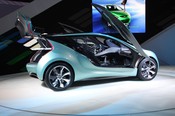
Over a week ago, we posted on this blog about the possibility of two, or even all three of the Detroit Three, GM, Ford and Chrysler, merging in some fashion.
Now our prediction is coming to life, a prediction based on our analysis of the realities of the world's economy and the auto industry. And one more, newer reality: That no company is, as the Los Angeles Times was still calling GM and Chrysler on Friday, "too big to fail."
GM and Chrysler are talking merger. Ford is publicly denying any merger interest, but the Times of London website reported late Saturday night that Ford has also quietly approached GM.
If the Detroit Three were to merge into one company, ownership shared with the American people, it could benefit everyone; the carmakers, their dealers and their customers. A single company could be in a better credit position to borrow needed cash, and - crucially - it would be able to take advantage of the entire $25 billion taxpayer bailout which has already begun to "trickle down" into Detroit Three bank accounts. 
(Daimler still owns almost 20% of Chrysler; that could change any minute now).
What might a merged Detroit Three look like?
GM, Chrysler and Ford employ about 400,000 people in the US, with over 150 plants and more than 14,000 dealerships in North America.
Ford also owns 33% of Mazda and is said to be shopping around for buyers for all or part of their stake. Ford has taken little if any advantage of the great engineering minds at Mazda. For all the good Ford has gotten, they might as well sell.
Ford offers buyers exactly one gas-electric hybrid: Their old, truck-based Escape SUV. Well, two, if you count Mercury's Escape twin, the Mariner hybrid (used by President and Mrs. Clinton, with Secret Service approval).
Any merger will result in many job losses, and scores of facilities would close. We need to make certain that Washington is ready, willing and able to provide whatever assistance these laid-off workers need. If they can bailout Wall Street, well, you know the rest ...
(Mazda is displaying this "Kiyora" concept car at the Paris Car Show this week; Ford owns over 30% of the company, but has not used Mazda as an engineering resource).
I'm tending towards the optimistic about everything our world is going through now. As it becomes clear a huge change in Washington is coming, it offers this rare possibility for all of us: Being able to start over, and doing it right this time.
Given that, there could certainly be established, in the next two or three years, a new American auto industry, streamlined, smart and "world class" in every way, especially in its product quality and development and use of new technologies.
There would be a period, perhaps a year or more, to sort the three companies into one. Cultural differences would be tough to overcome, but at least all the parties would speak a common language (just one of the problems which doomed the Daimler and Chrysler "merger" from the start).
Imagine the possibilities of Detroit Three automotive brain-power under just one roof. Many European and Asian carmakers receive financial support from their respective governments for research and development projects of all kinds, so this new merged company could offer Washington "one-stop shopping."
With a single carmaker, we taxpayers would know where our money was going, for what, and we will eventually enjoy driving new, snazzy, fun, high-tech and clean American-made cars. And if other carmakers want to borrow some of our new automotive technology (as Nissan does with their Altima hybrid, paying for Toyota-developed tech), then we taxpayers might even see some return on our investment.
(This 2005 Chrysler Crossfire was a re-badged Mercedes SLK, and the US version didn't even come with the automatic retractable hardtop, the SLK's coolest feature; the Daimler-Chrysler merger was a loser almost from day one).
Cerberus Capital Management owns 80% of Chrysler, while Daimler still owns about 20%. If GM buys that 20%, and the 80% from Cerberus, all parties could ultimately benefit. I'm certain that someone could figure out a way to bring Ford into this new company.
Cerberus also owns a 51% stake in GMAC, General Motors' huge finance, insurance and home mortgage business (Cerberus paid $14 billion for it two years ago). Cerberus could also swap GM Chrysler's automotive operations for the remaining 49% of GMAC. Cerberus will also talk with off-shore carmakers for some sort of Chrysler deal.
Cerberus has as much concern for this country and its workers and taxpayers as - well, as AIG, Countrywide and all the rest of those highly-vaunted investment outfits, now mostly DOA. Just look at all the problems caused by their buying Chrysler. Placing the failed-and-fired ex-CEO of Home Depot in the top position at Chrysler was just one mistake, albeit an enormous one.
(Chevrolet's 2010 Camaro concept wow'ed 'em at the 2006 Los Angeles Auto Show, but belongs to an age of cheap gas and outlandish, even cartoonish, styling; there's a place for cars like these, but not on mass-production assembly lines - Steve Parker photo).
A single American carmaker would enjoy great support in its home market. Car-buyers know there is no such thing as a real "American-made" car or truck, and would gladly overlook where some parts come from and where some of the vehicles are assembled for a car or truck in which they have an ownership - and pride - stake.
But Detroit has to make the first move. They have to apologize for past transgressions (there's a load of them), and convince all of us they are finally willing to make the leaps into the future which they've avoided the past 30 years and more. The public will never again fall for those, "We only made gigantic SUVs because the public demanded them" explanations/excuses.
Whatever this new American car-making industry may look like, product will still be king; if it's not right, then all the help in the world won't save Detroit.
